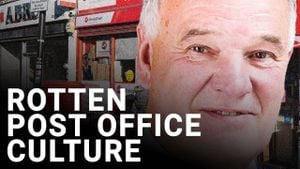Germany's Free Democratic Party (FDP) is finding itself at the center of political turmoil following its recent decision to collapse the coalition government led by Chancellor Olaf Scholz. Reports indicate this move was not as sudden as it seemed; FDP officials allegedly had devised plans to exit the coalition weeks prior to the government's downfall.
The backdrop to this dramatic political shift includes longstanding tensions among the coalition partners—the SPD, the Greens, and the FDP—over budgetary concerns and ideological differences. The discord came to a head when Scholz dismissed the FDP's Finance Minister Christian Lindner, which prompted the FDP to pull out completely, resulting in the government's collapse.
Earlier this month, it’s reported the FDP referred to its internal scheming to exit the coalition as “D-Day.” The discussions began at meetings held at a villa in Potsdam, where party officials, including Lindner, strategized on their next moves. German publications, Die Zeit and Süddeutsche Zeitung, disclosed details surrounding these clandestine discussions. The reports suggest party leadership was increasingly worried about their polling numbers, which had slipped below 5%, making it imperative for the FDP to reevaluate its position amid fears of losing parliamentary representation altogether.
During the latest round of discussions with Scholz, Lindner was said to have presented two options: either align on economic policy reforms or agree on the orderly termination of the coalition through mutual consent for fresh elections. Yet these proposed options quickly unraveled following the fallout from Lindner's dismissal.
It's important to note the coalition's history of instability. The FDP's continued frustration with what they viewed as unreasonable constraints from the SPD and Green Party leaders played a significant role in the overarching tension. Indications of discontent had been mounting, particularly concerning their internal economic policies and the handling of issues like climate change, which Lindner aimed to adjust significantly.
Political analysts view this collapse as emblematic of the broader instability facing European governments, especially as they navigate pressing economic challenges and external pressures, including the continuing impact of the war in Ukraine. Lindner’s attempt to introduce drastic budget reforms was seen as crossing the line, leading to his eventual ousting from the finance minister role, which he held for just over two years.
Now, with early elections looming on the horizon for February 2025, possible outcomes are cause for speculation. Political players are already gearing up for what many anticipate to be fierce competition, especially with Lindner’s FDP's low polling figures. There’s also concern for the potential formation of new alliances, with many observers speculating about the possible return to prominence of the CDU/CSU as they look to capitalize on the current chaos.
Rolf Mützenich, leader of the SPD parliamentary group, criticized Lindner’s actions, calling them politically opportunistic and disrespectful, particularly considering the historical weight associated with the term 'D-Day.' Amidst all this turmoil, the German public is left grappling with the ramifications of this political drama, questioning the efficacy and stability of the current government as it confronts both domestic and international challenges.
The FDP's controlling faction could face uneasy stakes, as their political strategies pivot from maintaining power within the coalition to possibly carving out new paths as the 2025 elections approach. Observers are left to wonder whether this aligns with the FDP's long-term goals or if the party is merely biding time until the dust settles.
With all eyes on Germany, the actions of the FDP may set the tone for the upcoming elections and the future direction of German politics, signaling whether the party can revive its support or if it will fall victim to its recent controversies.
While the political game continues to evolve, one thing remains clear: the FDP's daring moves have reshaped the political landscapes of Germany, raising questions about the governing dynamics and the collective response from the electorate. How the public perceives these developments will likely be pivotal as the nation prepares for the return to the polls.



